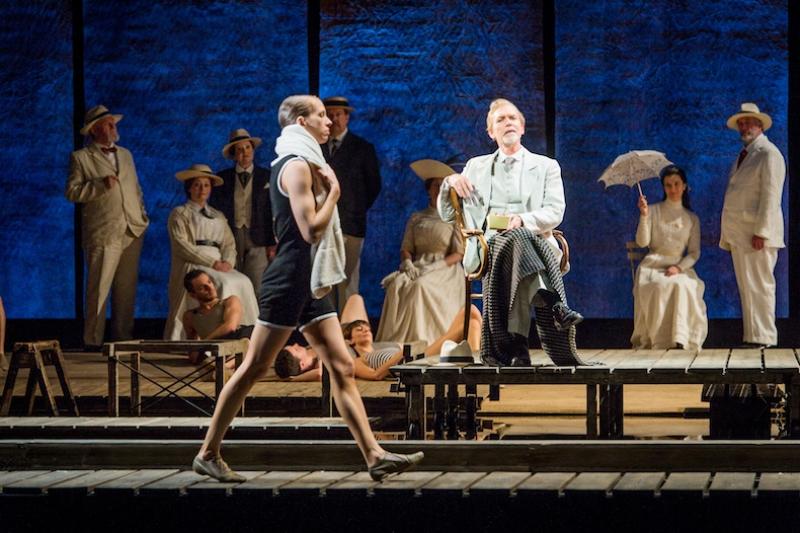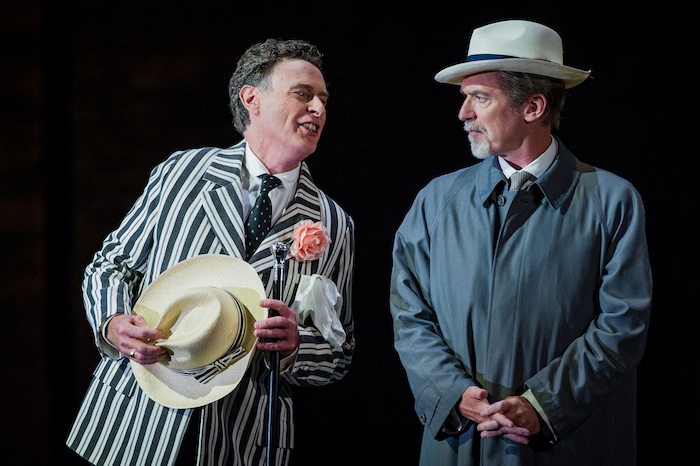Death in Venice, Opera North | reviews, news & interviews
Death in Venice, Opera North
Death in Venice, Opera North
Gabrieli meets gamelan in Britten's final opera

From the strange, stuttering opening to its elegiac, drawn-out coda, this is an exquisite, lovingly realised staging of Britten's last opera. It's so good that it amplifies any doubts that you might have about this peculiar, distinctly unlovable piece.
Perhaps we've been spoilt here in Leeds by the concurrent revivals of Peter Grimes and A Midsummer Night's Dream – both vibrant, colourful operas. Death in Venice is a tougher proposition – the score so spare, so parched that you can't help suspecting at times that Britten's inspiration was starting to flag. Thomas Mann's source novella was skilfully adapted by Britten and librettist Myfanwy Piper, but the first act in particular feels much too long for its slender musical material, Alan Oke's Aschenbach called upon to deliver rather too many streams of thin, piano-accompanied recitative. Britten could be a remarkable, characterful melodist. Here, it's as if he's expending every effort to suppress the gift.
Alan Oke is superb at conveying Aschenbach's physical decline
Which means that the sporadic flashes of colour in Act 1 have a huge impact. You'll squirm with delight at the chiming bells and archaic, hocketing brass which ring out when Aschenbach arrives in Venice, and there's a glorious, potent theme which accompanies his looking out at the sea from his hotel window, later developed to fascinating effect. The second act is more varied and compelling, its closing minutes an unearthly, sublime mixture of Balinese gamelan and late-period Mahler. You marvel at Britten's percussion writing, able to suggest a steamboat's engine or children's games with deft ease. The musical glancing back at the comparative innocence and exuberance of Britten's ballet The Prince of the Pagodas is disquieting, and entirely at odds with the oppressiveness, the dourness of what we hear in this opera.
Yoshi Oida's 2007 staging, here revived by Rob Kearley, still looks tremendous. Tom Schenk's spare set makes imaginative use of wooden decking and real water – though if you're sat in the stalls, you might not notice. Aschenbach's gondola trips are neatly implied by little more than a dancer wielding an oar, and the crowd scenes are well done, the immaculate period costumes nicely at odds with the score's uneasy modernity.
It's beautifully lit by Paule Constable. Better still is the choreography, originally by Daniela Kurz but here revived by Katharina Bader, the extended children's dance sequences visually compelling. Vocally, all is good. Alan Oke copes heroically with Britten's demands, and he's superb at conveying Aschenbach's physical decline.
 Surtitles are only used for the chorus work, but I found Oke's diction to be perfectly clear, and he does succeed in evoking our sympathy. A chameleon-like Peter Savidge skilfully inhabits the multiple roles – most strikingly a grotesque Elderly Fop (pictured above) and an oleaginous Barber, whose crude attempt to rejuvenate Aschenbach near the opera's close is toe-curlingly uncomfortable.
Surtitles are only used for the chorus work, but I found Oke's diction to be perfectly clear, and he does succeed in evoking our sympathy. A chameleon-like Peter Savidge skilfully inhabits the multiple roles – most strikingly a grotesque Elderly Fop (pictured above) and an oleaginous Barber, whose crude attempt to rejuvenate Aschenbach near the opera's close is toe-curlingly uncomfortable.
Dancer Emily Mézières plays the mute Tadzio, looking suitably androgynous and otherworldly. The score is dispatched with skill and sensitivity by the ever-attentive Richard Farnes. An unsettling, oddly gripping evening.
Add comment
The future of Arts Journalism
You can stop theartsdesk.com closing!
We urgently need financing to survive. Our fundraising drive has thus far raised £49,000 but we need to reach £100,000 or we will be forced to close. Please contribute here: https://gofund.me/c3f6033d
And if you can forward this information to anyone who might assist, we’d be grateful.

Subscribe to theartsdesk.com
Thank you for continuing to read our work on theartsdesk.com. For unlimited access to every article in its entirety, including our archive of more than 15,000 pieces, we're asking for £5 per month or £40 per year. We feel it's a very good deal, and hope you do too.
To take a subscription now simply click here.
And if you're looking for that extra gift for a friend or family member, why not treat them to a theartsdesk.com gift subscription?
more Opera
 The Railway Children, Glyndebourne review - right train, wrong station
Talent-loaded Turnage opera excursion heads down a mistaken track
The Railway Children, Glyndebourne review - right train, wrong station
Talent-loaded Turnage opera excursion heads down a mistaken track
 La bohème, Opera North review - still young at 32
Love and separation, ecstasy and heartbreak, in masterfully updated Puccini
La bohème, Opera North review - still young at 32
Love and separation, ecstasy and heartbreak, in masterfully updated Puccini
 Albert Herring, English National Opera review - a great comedy with depths fully realised
Britten’s delight was never made for the Coliseum, but it works on its first outing there
Albert Herring, English National Opera review - a great comedy with depths fully realised
Britten’s delight was never made for the Coliseum, but it works on its first outing there
 Carmen, English National Opera review - not quite dangerous
Hopes for Niamh O’Sullivan only partly fulfilled, though much good singing throughout
Carmen, English National Opera review - not quite dangerous
Hopes for Niamh O’Sullivan only partly fulfilled, though much good singing throughout
 Giustino, Linbury Theatre review - a stylish account of a slight opera
Gods, mortals and monsters do battle in Handel's charming drama
Giustino, Linbury Theatre review - a stylish account of a slight opera
Gods, mortals and monsters do battle in Handel's charming drama
 Susanna, Opera North review - hybrid staging of a Handel oratorio
Dance and signing complement outstanding singing in a story of virtue rewarded
Susanna, Opera North review - hybrid staging of a Handel oratorio
Dance and signing complement outstanding singing in a story of virtue rewarded
 Ariodante, Opéra Garnier, Paris review - a blast of Baroque beauty
A near-perfect night at the opera
Ariodante, Opéra Garnier, Paris review - a blast of Baroque beauty
A near-perfect night at the opera
 Cinderella/La Cenerentola, English National Opera review - the truth behind the tinsel
Appealing performances cut through hyperactive stagecraft
Cinderella/La Cenerentola, English National Opera review - the truth behind the tinsel
Appealing performances cut through hyperactive stagecraft
 Tosca, Royal Opera review - Ailyn Pérez steps in as the most vivid of divas
Jakub Hrůša’s multicoloured Puccini last night found a soprano to match
Tosca, Royal Opera review - Ailyn Pérez steps in as the most vivid of divas
Jakub Hrůša’s multicoloured Puccini last night found a soprano to match
 Tosca, Welsh National Opera review - a great company reduced to brilliance
The old warhorse made special by the basics
Tosca, Welsh National Opera review - a great company reduced to brilliance
The old warhorse made special by the basics
 BBC Proms: The Marriage of Figaro, Glyndebourne Festival review - merriment and menace
Strong Proms transfer for a robust and affecting show
BBC Proms: The Marriage of Figaro, Glyndebourne Festival review - merriment and menace
Strong Proms transfer for a robust and affecting show
 BBC Proms: Suor Angelica, LSO, Pappano review - earthly passion, heavenly grief
A Sister to remember blesses Puccini's convent tragedy
BBC Proms: Suor Angelica, LSO, Pappano review - earthly passion, heavenly grief
A Sister to remember blesses Puccini's convent tragedy

Comments
As one who probably likes
At the risk of turning this